外研社七年级下册英语语法
外研版七年级英语下册各模块语法知识汇总+专项练习
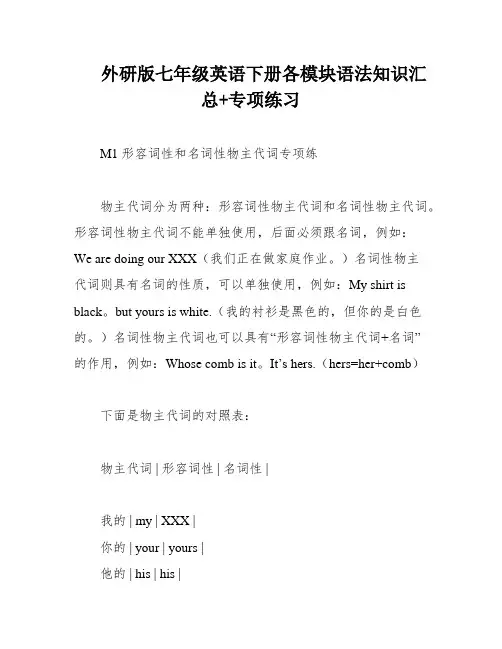
外研版七年级英语下册各模块语法知识汇总+专项练习M1 形容词性和名词性物主代词专项练物主代词分为两种:形容词性物主代词和名词性物主代词。
形容词性物主代词不能单独使用,后面必须跟名词,例如:We are doing our XXX(我们正在做家庭作业。
)名词性物主代词则具有名词的性质,可以单独使用,例如:My shirt is black。
but yours is white.(我的衬衫是黑色的,但你的是白色的。
)名词性物主代词也可以具有“形容词性物主代词+名词”的作用,例如:Whose comb is it。
It’s hers.(hers=her+comb)下面是物主代词的对照表:物主代词 | 形容词性 | 名词性 |我的 | my | XXX |你的 | your | yours |他的 | his | his |她的 | her | hers |它的 | its | its |我们的 | our | ours |你们的 | your | yours |他们的 | their | theirs |需要注意的是,名词性物主代词可指一件东西,也可指很多件东西,需要根据上下文来决定。
例如:选择填空:1.This is my teapot。
It’s not __________。
(your/ yours)2.My hairdryer is on the desk。
Where’s ____________?(her/ hers)3.___________ hairdryer is not on the table。
___________ is there。
(Her/ Mine)4.Whose calculator is it?It’s __________。
It’s __________ XXX)5.Are they ___________ (your/ yours) combs。
Yes。
they’re _________(our/ ours).用所给词的适当形式填空:1.That is not _________ kite。
初一下册英语语法大全外研版
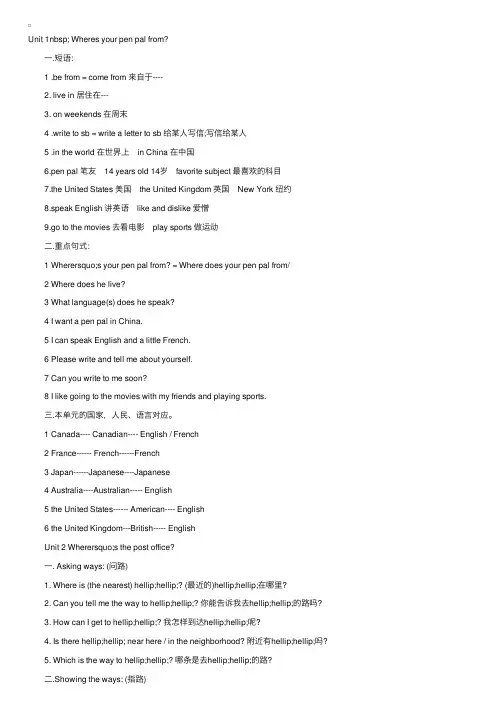
Unit 1nbsp; Wheres your pen pal from? ⼀.短语: 1 .be from = come from 来⾃于---- 2. live in 居住在--- 3. on weekends 在周末 4 .write to sb = write a letter to sb 给某⼈写信;写信给某⼈ 5 .in the world 在世界上 in China 在中国 6.pen pal 笔友 14 years old 14岁 favorite subject 最喜欢的科⽬ 7.the United States 美国 the United Kingdom 英国 New York 纽约 8.speak English 讲英语 like and dislike 爱憎 9.go to the movies 去看电影 play sports 做运动 ⼆.重点句式: 1 Wherersquo;s your pen pal from? = Where does your pen pal from/ 2 Where does he live? 3 What language(s) does he speak? 4 I want a pen pal in China. 5 I can speak English and a little French. 6 Please write and tell me about yourself. 7 Can you write to me soon? 8 I like going to the movies with my friends and playing sports. 三.本单元的国家,⼈民、语⾔对应。
1 Canada---- Canadian---- English / French 2 France------ French------French 3 Japan------Japanese----Japanese 4 Australia----Australian----- English 5 the United States------ American---- English 6 the United Kingdom---British----- English Unit 2 Wherersquo;s the post office? ⼀. Asking ways: (问路) 1. Where is (the nearest) hellip;hellip;? (最近的)hellip;hellip;在哪⾥? 2. Can you tell me the way to hellip;hellip;? 你能告诉我去hellip;hellip;的路吗? 3. How can I get to hellip;hellip;? 我怎样到达hellip;hellip;呢? 4. Is there hellip;hellip; near here / in the neighborhood? 附近有hellip;hellip;吗? 5. Which is the way to hellip;hellip;? 哪条是去hellip;hellip;的路? ⼆.Showing the ways: (指路) 1. Go straight down / along this street. 沿着这条街⼀直⾛。
新外研版七年级英语下册(全套)知识点汇总语法知识汇总
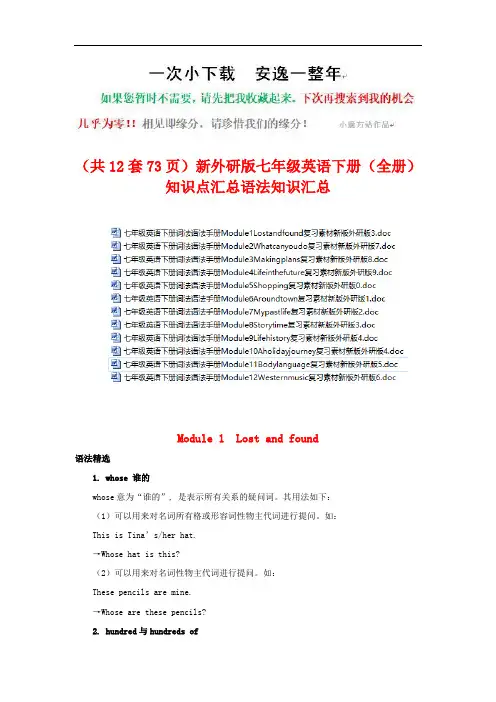
(共12套73页)新外研版七年级英语下册(全册)知识点汇总语法知识汇总Module 1 Lost and found语法精选1. whose 谁的whose意为“谁的”, 是表示所有关系的疑问词。
其用法如下:(1)可以用来对名词所有格或形容词性物主代词进行提问。
如:This is Tina’s/her hat.→Whose hat is this?(2)可以用来对名词性物主代词进行提问。
如:These pencils are mine.→Whose are these pencils?2. hundred与hundreds ofhundred是一个确数, 表示“一百”;hundreds of是一个概数, 表示“好几百的;许许多多的”。
当 hundred前面有一个具体的数词时, hundred不变为复数。
如:①two hundred cows两百头奶牛②Hundreds of people come here ev ery day.每天都有许多人到这里来。
注意:当hundred与of连用时, 它后面的名词和它本身都用复数。
如:hundreds of cows 几百头奶牛3. such as 比如;例如such as意为“比如;例如”, 用于引出多个例子。
如:I like some animals such as lions and monkeys. 我喜欢一些动物, 比如狮子和猴子。
注意:for example也意为“比如;例如”, 用来举例说明某一论点或情况, 一般只举同类人或物中的“一个”为例, 作插入语, 可位于句首、句中或句末。
如:①For example, air is invisible.例如, 空气是看不见的。
②He, for example, is a good student.例如, 他就是个好学生。
③Many boys like playing basketball. Take me, for example.许多男孩喜欢打篮球。
七年级下册外研社知识点
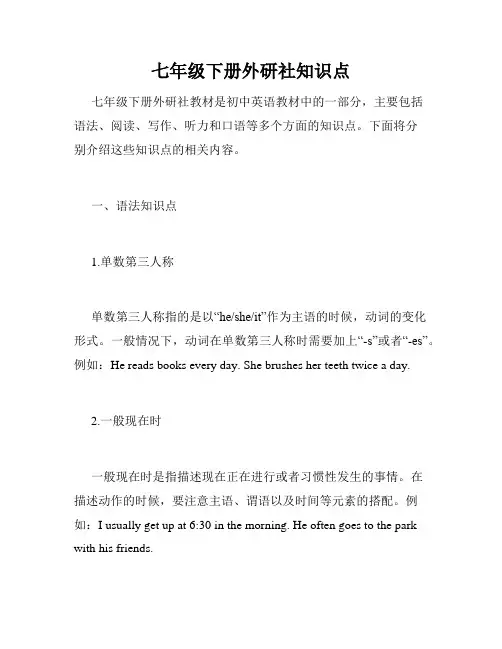
七年级下册外研社知识点七年级下册外研社教材是初中英语教材中的一部分,主要包括语法、阅读、写作、听力和口语等多个方面的知识点。
下面将分别介绍这些知识点的相关内容。
一、语法知识点1.单数第三人称单数第三人称指的是以“he/she/it”作为主语的时候,动词的变化形式。
一般情况下,动词在单数第三人称时需要加上“-s”或者“-es”。
例如:He reads books every day. She brushes her teeth twice a day.2.一般现在时一般现在时是指描述现在正在进行或者习惯性发生的事情。
在描述动作的时候,要注意主语、谓语以及时间等元素的搭配。
例如:I usually get up at 6:30 in the morning. He often goes to the park with his friends.3.名词的复数形式一般情况下,名词的复数形式在末尾加上“-s”或者“-es”。
但是,也有一些特殊的名词需要按照不同规则进行复数变化。
例如:child—children, foot—feet, tooth—teeth等。
二、阅读知识点1.推理判断阅读理解中的推理判断是指通过文章中的信息以及自己的知识和常识来进行推断和判断。
在进行推测的时候,要根据文章的细节和线索来确定答案。
例如:根据文章中的描述和“most people think”这个词组,可以推测出某个问题的答案。
2.对话理解对话理解是指通过对文章中对话的理解来回答问题。
在进行对话理解的时候,要注意对话中人物的身份、关系以及他们所表达的含义和态度等信息。
例如:根据一段对话中的表述,可以推断出讲话者想要表达的意思。
三、写作知识点1.书信格式书信格式包括信头、称呼、正文、结尾和署名等几个要素。
在书写书信的时候,要根据信件的类型来选择不同的格式,包括正式和非正式等。
例如:正式信件需要使用较为规范的格式,而非正式信件可以根据自己的口味进行自由发挥。
外研版七下英语语法总结(一)
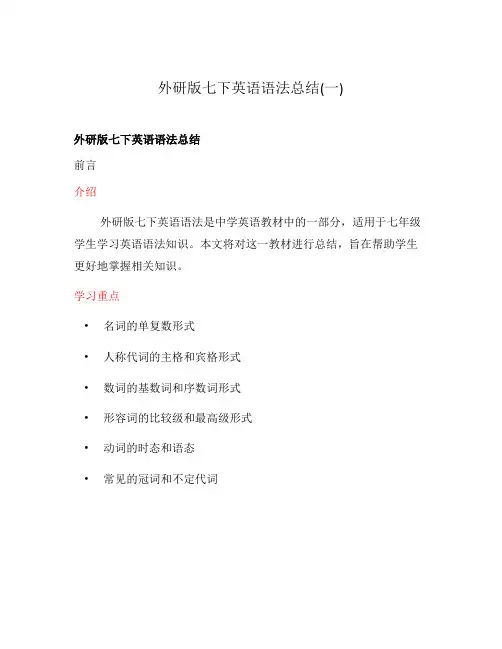
外研版七下英语语法总结(一)外研版七下英语语法总结前言介绍外研版七下英语语法是中学英语教材中的一部分,适用于七年级学生学习英语语法知识。
本文将对这一教材进行总结,旨在帮助学生更好地掌握相关知识。
学习重点•名词的单复数形式•人称代词的主格和宾格形式•数词的基数词和序数词形式•形容词的比较级和最高级形式•动词的时态和语态•常见的冠词和不定代词正文名词的单复数形式•名词的单数和复数形式有规律可循,如加-s和-es,或者变化整个词形等。
•需要注意的是,有些名词的复数形式是不规则的,需要特别记忆。
人称代词的主格和宾格形式•人称代词根据在句中的不同作用,分为主格和宾格形式。
•主格用于作主语,宾格用于作宾语或补语。
数词的基数词和序数词形式•基数词用来表示具体的数目,如one, two, ten等。
•序数词用来表示顺序,如first, second, tenth等。
形容词的比较级和最高级形式•形容词有比较级和最高级两种形式,用于描述事物的程度。
•通过在形容词后面加-er和-est,或者在前面加more和most来构成比较级和最高级。
动词的时态和语态•动词根据时间的不同,可以分为一般现在时、一般过去时和一般将来时等时态。
•动词的语态包括主动语态和被动语态,用于描述动作的执行者和承受者。
常见的冠词和不定代词•冠词包括定冠词和不定冠词,用于限定名词的范围。
•不定代词用来代替不确定的人或物,如somebody, anybody, something等。
结尾外研版七下英语语法是学生学习英语语法的重要教材之一。
通过对名词、人称代词、数词、形容词、动词和冠词等知识点的学习,学生可以更好地理解和运用英语语法规则。
希望本文的总结对学生的学习有所帮助。
外研社七年级下册Module1语法知识汇总
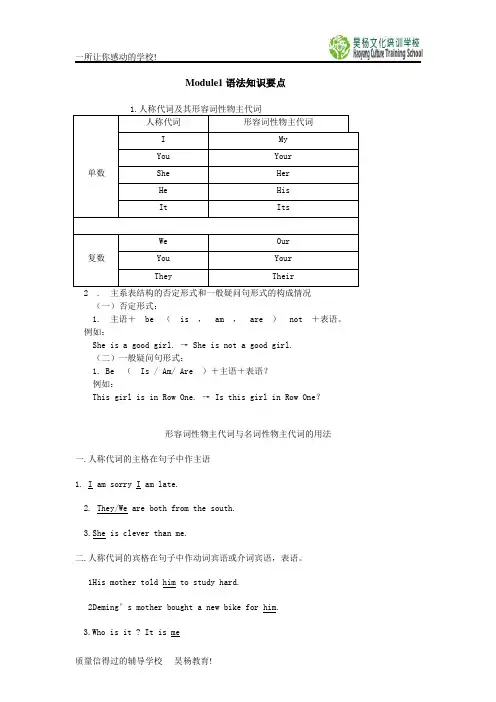
Module1语法知识要点人称代词形容词性物主代词I MyYou Your 单数She HerHe HisIt ItsWe Our 复数You YourThey Their2 . 主系表结构的否定形式和一般疑问句形式的构成情况(一)否定形式:1. 主语+be (is ,am ,are )not +表语。
例如:She is a good girl. → She is not a good girl.(二)一般疑问句形式:1. Be (Is / Am/ Are )+主语+表语?例如:This girl is in Row One. → Is this girl in Row One?形容词性物主代词与名词性物主代词的用法一.人称代词的主格在句子中作主语1. I am sorry I am late.2. They/We are both from the south.3.She is clever than me.二.人称代词的宾格在句子中作动词宾语或介词宾语,表语。
1His mother told him to study hard.2Deming’s mother bought a new bike for him.3.Who is it ? It is me三.形容词性物主代词一般位于名词前,用作定语。
1 My name is John Green. 我叫约翰·格林。
2Excuse me, is this your car? 对不起,这是您的车吗?3 His parents are in England. 他的父母在英国。
4They wash their faces every day. 他们每天都洗脸。
英语人称代词和物主代词一、人称代词表示“我”、“你”、“他”、“她”、“它”、“我们”、“你们”、“他们”的词,叫人称单数复数主格宾格主格宾格第一人称I me we us 第二人称you you you you第三人称he himthey them she herit it人称代词主格:作主语,表示谁怎么样了、干什么了。
(完整版)外研版七年级下学期英语语法总结
外研版七年级下学期英语语法总结1. 词类:物主代词、情态动词can和方位介词短语2. 时态:一般将来时态和一般过去时态3. 句型:特殊疑问句、祈使句、感叹句和选择疑问句一. 物主代词1. 物主代词:表示所属关系的代词(…属于谁的)2. 形容词性物主代词和名词性物主代词的关系:(1)形容词性物主代词:必须和名词在一起。
My father, your teacher...(2)名词性物主代词:相当于与之相对应的形容词性物主代词+名词。
This shirt is mine. =This is my shirt.二. 情态动词can1. 含义:表达人或物的能力,能或会...…2. 特点:情态动词can没有人称和数的变化,之后要加动词原形。
3. 否定形式:cannot(正式用法)=can’t(口语)4. 句型结构:(1)肯定句:主语 + 情态动词 + 动词原形 + 其他 + 。
She / They can swim well.(2)否定句:主语 + 情态动词 + not + 动词原形 + 其他 + 。
She / They can not swim well.(3)一般疑问句:情态动词 + 主语 + 动词原形 + 其他 + ?Can she / they swim well?Yes, she / they can. / No, she / they can’t.(4)特殊疑问句:特殊疑问词 + 情态动词 + 主语 + 动词原形 + 其他 + ?Why can she / they swim well?Who can swim well?三. 介词between...and... 在两者之间Lingling sits between Tony and Daming. 玲玲坐在托尼和大明之间。
among 在三者或三者以上之间Miss Li is among lots of students. 李老师在许多同学之间。
外研版七年级下英语语法内容
Whose bag is this?1、特殊疑问句:Whose where what when how...+一般疑问句回答:具体的事、你正在做什么?What are you doing?I am having lunch.2、first of all首先3、There is some water.(water不可数名词,用is)There be句型中be取决于后面的名词There are some apples.There is some fruit.There be 句型后,主语包含两者或以上,be的形式就近原则(与be最近的主语形式保持一致)There(is)a pen and two books on the desk.There(are )two books and a pen on the desk.出问题了:There is something wrong with.....4、a lot of=lots of许多a lot of+名词表示数量许多......a lot+动词表示程度上的=very muchThanks a lot 非常感谢A bit hot一点热主格宾格形容词性物主代词名词性物主代词I me my mineyou you your yourswe us our ourshe him his hisshe her her hersthey them their theirsit it its它的its(区分it’s 它是)We help him.Yours:your crayontape 磁带Mine=my tapes5.---Thank you!=Thanks .-----You are welcome!不客气,不用谢6、询问颜色:What’s the colour?=What colour is it?7、名词所有格Amy’s bag. The teachers’ desks.Amy and Lingling’s room. 一个房间Amy’s and Lingling’s rooms.两个房间Yours=your watchHers=her watch8、be careful with 小心.....+ 名词、代词You are careful with the car.请小心骑你的自行车Please be careful with your bike.be careful 小心、当心Be careful !The road is dangerous. 小心!路上危险。
外研版七年级下学期英语语法总结
外研版七年级下学期英语语法总结1、词类:物主代词、情态动词can与方位介词短语2、时态:一般将来时态与一般过去时态3、句型:特殊疑问句、祈使句、感叹句与选择疑问句一、物主代词1、物主代词:表示所属关系的代词(…属于谁的)2、形容词性物主代词与名词性物主代词的关系:(1)形容词性物主代词:必须与名词在一起。
My father, your teacher、、、(2)名词性物主代词:相当于与之相对应的形容词性物主代词+名词。
This shirt is mine、 =This is my shirt、二、情态动词can1、含义:表达人或物的能力,能或会、、、…2、特点:情态动词can没有人称与数的变化,之后要加动词原形。
3、否定形式:cannot(正式用法)=can’t(口语)4、句型结构:(1)肯定句:主语 + 情态动词 + 动词原形 + 其她 + 。
She / They can swim well、(2)否定句:主语 + 情态动词 + not + 动词原形 + 其她 + 。
She / They can not swim well、(3)一般疑问句: 情态动词 + 主语 + 动词原形 + 其她 + ?Can she / they swim well?Yes, she / they can、 / No, she / they can’t、(4)特殊疑问句: 特殊疑问词 + 情态动词 + 主语 + 动词原形 + 其她 + ?Why can she / they swim well?Who can swim well?三、介词between、、、and、、、在两者之间Lingling sits between Tony and Daming、玲玲坐在托尼与大明之间。
among 在三者或三者以上之间Miss Li is among lots of students、李老师在许多同学之间。
四、一般将来时1、时间状语:in+一段时间;tomorrow;in the future; next+时间;this+时间(表示将来时间的状语)2、 be(is,am、are) going to do的用法。
七年级英语下册语法知识点归纳总结外研版
七年级英语下册语法知识点归纳总结外研版一、时态1. 一般现在时:主要用来表示经常性、习惯性、规律性的动作或状态,也可用来表示现阶段发生的事件和现阶段存在的事物状态。
其用法主要通过动词的形式来体现。
2. 现在进行时:用来表示现阶段正在进行或经常发生的动作,其用法与一般现在时类似,通过动词的现在分词形式来体现。
二、名词复数规则1. 一般情况下,直接在词尾加s。
如:book-books,map-maps 等。
2. 以s,x,sh,ch结尾的名词,加es。
如:bus-buses,box-boxes等。
3. 以辅音字母加y结尾的名词,变y为i再加es。
如:country-countries,factory-factories等。
三、代词用法1. 人称代词:表示代词所指的人或事物在句子中的关系,分为主格和宾格两种形式。
2. 物主代词:表示所有关系的代词,分为形容词性物主代词和名词性物主代词两种形式。
四、介词用法1. in,on,at表示时间或地点的方式。
如:in the morning,on Monday,at the table等。
2. by,with表示方式或工具。
如:by bus,with a pen等。
五、形容词比较等级用法1. 比较级:表示两者之间的比较,通过比较级后缀-er或连词than来体现。
2. 最高级:表示三者或三者以上之间的比较,通过最高级后缀-est或副词very,most来体现。
六、一般疑问句及回答一般疑问句是将疑问句以系动词be或助动词do及其时态形式提出,并用简短的肯定或否定回答。
通常用yes或no来回答。
以上就是七年级英语下册语法知识点归纳总结外研版的主要内容,希望对学生们的学习有所帮助。
- 1、下载文档前请自行甄别文档内容的完整性,平台不提供额外的编辑、内容补充、找答案等附加服务。
- 2、"仅部分预览"的文档,不可在线预览部分如存在完整性等问题,可反馈申请退款(可完整预览的文档不适用该条件!)。
- 3、如文档侵犯您的权益,请联系客服反馈,我们会尽快为您处理(人工客服工作时间:9:00-18:30)。
外研社七年级下册英语语法Module 11. First of all, come and look in the lost and found box!首先,过来看看失物招领箱吧!first of all 的意思是“首先”,常用于句首。
例如:First of all, let me introduce my friend Lily to you.首先,让我向你介绍我的朋友莉莉。
find v.发现;找到Many people here cannot find work.这里很多人都找不到工作。
So far they have not found a way to fight the virus.迄今为止,他们还没有找到一种对抗该病毒的方法。
3. Everyone, please be careful with your things from now on.从现在开始,请每个人小心保管自己的物品。
be careful with 的意思是“小心(对待)……”。
例如:Be careful with that knife, or you’ll cut yourself.小心那把刀子,否则你会划伤自己。
from now on 的意思是“从现在开始”例如:From now on, things are going to be different around here.从现在起,这附近的情况将发生变化。
4. in a hurry 匆匆忙忙She went to the school in a hurry.她匆匆忙忙地去学校了。
Don’t be in a hurry. 不要着急。
5. They leave things on planes, on trains, on buses and taxis.他们把东西落在飞机、火车、公交车和出租车上。
leave 这里表示“落下,遗忘”,它还有很多其他的含义:1) 表示“离开”,例如:Nancy wants to be a doctor when she leaves school.南希毕业后想当一名医生。
2) 表示“把(某人或某物)留在(某处)”,例如:I often leave the kids with Susan.我经常把孩子们留给苏珊(照顾)。
3) 表示“留到,留待”,例如:Leave it another week, then tell he’ll have to decide.把此事再放一周,到时告诉他必须做出决定。
4) leave 还可以用作名词,表示“假期,休假”,例如:I have to ask for three day’s leave.我得请三天假。
6. Hundreds of people come here every day.每天都有许多人到这里来。
hundred 是一个确数,表示“一百”;hundreds of 是一个概数,表示“好几百,许许多多”。
当 hundred 前面有一个具体的数词时,hundred 不变为复数例如:two hundred cows 两百头奶牛当 hundred 与 of 连用时,它后边的名词和它本身都用复数,例如: hundreds of cows 几百头奶牛Module 21.I’d like to join the Music Club because I can play the piano. 我想加入音乐社团是因为我会弹钢琴。
1)定冠词the用于西洋乐器前(民族乐器前不加)play the piano 弹钢琴play the violin 拉小提琴2)中国乐器名词前不与冠词连用:play erhu 拉二胡3)进行球类运动、下棋不用冠词:play basketball 打篮球play volleyball 打排球play football 踢足球play chess 下棋2. I think she’d like to join the Dance Club because she can really well. 我认为她想加入舞蹈俱乐部,因为她真的跳得好。
would like意为“想要”,其语气比用 like 婉转些。
具体用法如下:1) 后面接名词或代词,表示“具体要”某样东西。
例如:I’d like two sweaters for my daughters.我想给我的女儿们买两件毛衣。
Would you like one of these mooncakes?你想要一块这样的月饼吗?2) 后面接动词不定式,表示“愿望,喜爱”,常用于有礼貌地提出邀请、请求或建议。
例如:I would like to be your class monitor.我想当班长。
Would you like to come to supper?你愿意来吃晚饭吗?3) 当主语是第一人称时, would 可与 should 换用,它们都可以缩写为‘d’,并且like也可换成love。
例如:I’m sure he would love to come.I should like the red one.我想要红色的。
I would like to be your class monitor.我想当班长。
Would you like to come to supper?你愿意来吃晚饭吗?3) 当主语是第一人称时, would 可与 should 换用,它们都可以缩写为‘d’,并且like也可换成love。
例如:I’m sure he would love to come.I should like the red one.我想要红色的。
4) would like后面可以用动词不定式作宾语补足语。
例如:What would you like me to do?你想要我干什么?I’d like you to meet my parents, too. 我想要你也见见我的父母。
3. I can cook eggs, but that’s all. 我会炒鸡蛋,但仅此而已。
that’s all是口语中一句非常有用的表法,其用法主要有以下三种:1) 表示仅此这些或无关紧要,意为:没别的;没事;没什么;事情就是这样。
如:—How are you feeling?你感觉怎么样?—Fine. Just a little tired. That’s all. 还好,只是有点累,没事。
2) 表示沮丧或无可奈何,意为:“没有(别的)办法”。
如:If it rains tomorrow, we shall have to stay at home, we can’t play football, that’s all. 如果明天下雨,我们只好呆在家里,不能出去踢球,没有别的办法。
3) 表示说话或做事完了(或暂时完了)。
意为: “……完了;……就这些”。
如:That’s all. Thank you. 我的发言完了,谢谢。
That’s all for today. 今天就到这里吧。
That’s all, you may go now. 就这些,你可以走了。
4. Don’t worry about Chinese. 别担心中文。
worry about = be worried about 担心Don’t worry about your son. = Don’t be worried about your son.不要担心你的儿子。
5. I get on well with everyone… 我和每个人都相处得很好…… get on well with... 与......相处融洽;进展顺利1) Do you get on well with your parents?你跟你父母相处得怎样?2) I get on very well with them.我和他们相处的非常好。
3) He is not easy to get on well with. 他不是一个容易相处的人如果要表达“与某人相处得不好”,可以用get on badly with sb. 如果想询问“与某人相处得怎样”,要用how来提问,例如:—How do you get on well with yourclassmates? 你跟同学相处得怎样?—Just so so. 一般般。
6. Choose me as your class monitor and I promise to help YOU! 选我当你们的班长,我保证会帮助你们!as的意思是“作为,当作”,例如:As a student, she has to finish her homework.作为一个学生,她必须完成作业。
promise “允诺;许诺”promise sb. to do sth.答应某人做某事make a promise许下诺言keep one’s promise保守诺言break one’s promise 打破诺言, 说话不算数7. I often help my mother do cleaning at home. 我经常帮助我妈妈在家打扫卫生。
do some cleaning 打扫卫生do some shopping 买东西do some reading 看书do some washing 洗衣服4. I’m always ready to help others.我总是准备帮助别人。
be ready to do sth. “准备好做某事”get ready to do sth. 和be ready to do sth.的意思是“准备做某事”。
前者强调行为;后者强调状态。
两者后面可接介词for,for后面接名词。
如:We are ready for the English test.8. I’m sure everybody would like a clean classroom, just like home. 我确信每个人都喜欢干净的教室,就好像家一样。
sure “确信的;有把握的”1) be sure +不定式用于祈使句,作“务必、一定”讲。
Be sure to come to my house.Be sure to finish your homework as soon as possible.2) be sure+从句,表“确信、对……有把握”I am sure that he is coming.= He is sure to come.3) make sure +从句 = make sure of弄清、查清楚Make sure that he has handed his workbook.Make sure of it before you start out.just like “正如,正像”The night of the celebration was just like Christmas for them.当晚的庆祝活动对他们来说就像圣诞节一般。
